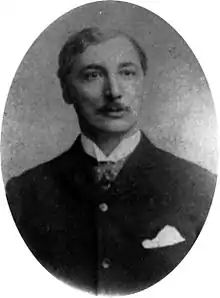James Cosmo Melvill (naturalist)
James Cosmo Melvill (1 July 1845 – 4 November 1929) was a British botanist and malacologist. He collected plants in Europe and North America.[1][2][3]
James Cosmo Melvill | |
|---|---|
 | |
| Born | 1 July 1845 |
| Died | 4 November 1929 (aged 84) |
| Nationality | British |
Family
Melvill was born at Hampstead, London, on 1 July 1845.[4] He was a grandson of British administrator in India, Sir James Cosmo Melvill (1792–1861), his father being the latter's second son, also James Cosmo Melvill (1821–1880), onetime assistant Under-Secretary of state for India.[5][4] His mother was Eliza Jane, daughter of Alfred Hardcastle of Hatcham House, Surrey.[4]
Melvill married on 30 July 1874, Bertha, daughter of George C. Dewhurst of Lymm, Cheshire and Aberuchill Castle, Perthshire, Scotland. The couple had two sons and four daughters.[4]
Education and career
Melvill was educated at Harrow School, and Trinity College, Cambridge, which he entered in 1864. He graduated Bachelor of Arts (B.A.) in 1864, and Master (M.A.) in 1871. in later life he became an honorary Doctor of Sciences (D.Sc.) from Manchester University in 1908.[6]
His natural history interests were never professional. He went into business in the Lancashire cotton industry, first in the cotton merchant business of his uncle Edward Hardcastle (who was also MP for South East Lancashire and later Salford North) from 1871, then in 1887[7] became director of the firm of Messrs G. and R. Dewhurst Ltd, of Manchester, Preston and London, East India and China cotton merchants.[4] He retired in 1904 but resumed his directorship of the latter firm because of the enlistments of his sons and other staff, during the time of the First World War.[7]
Mevill also became a governor of Manchester University and Manchester Grammar School.[4] He was President of the Manchester Literary and Philosophical Society from 1897 to 1899.[1] Politically he was a supporter of the Conservative Party[4][8] but despite posthumous claims he was onetime Member of Parliament for Salford South[9][10] he neither served in Parliament nor contested the Salford seats as a parliamentary candidate at general elections.
In 1904 he settled in Shropshire at Meole Hall, Meole Brace near Shrewsbury. In that county he became a governor of the Royal Salop Infirmary, an honorary curator of Shrewsbury Museum and president of the Caradoc and Severn Valley Field Club.[8] Incapacitated by a fall which dislocated his shoulder,[7] he died at Meole Hall on 4 November 1929[6] and was buried on 7 November in Shrewsbury General Cemetery in Longden Road.[8]
Natural history activities
Melvill collected shells from the age of eight and ultimately possessed a collection representing 25,500 species of mollusc, including a thousand new species from the Persian Gulf and South Africa.[8]
His botanical collection, which included specimens assembled by other botanists, was one of the largest private herbaria in the country and was kept in a special building in his garden at Meole Hall.[9] It was said to amount to three-quarters of the known plants in the world, especially grasses and ferns, most of which he gave to Manchester University. He presented that of British ferns and grasses to Harrow School,[8][10] a collection later transferred to the National Botanic Garden of Wales.[10] The Manchester Herbarium contains contributions from James Cosmo Melvill among other botanists.[11][12]
He also had an extensive entomological collection of British butterflies, wasps, flies, and dragonflies.[8]
While at school he was joint author, with the Honourable F. Bridgeman,[8] of Flora of Harrow School, published in 1864.[13] He published many natural history papers in his lifetime. He was a Fellow of the Linnean Society and the Zoological Society of London and onetime president of the Conchological Society of Great Britain,[8] as well as president of the Manchester Conchological Society in 1889 and 1895–96.[14] From 1904 to 1914 he was President of the Shrewsbury-based Caradoc and Severn Valley Field Club and in 1908 was appointed chairman of its committee to publish a Flora of Shropshire, a project which was shelved due to lack of sufficient financial support in 1913.[15]
The World Register of Marine Species mentions 881 marine taxa described by J.C. Melvill, many of which together with Robert Standen (1854–1925).[16] Many of these have become synonyms.
The rein orchid variety "Habenaria melvillii" was botanically named for him.[9]
References
- "Obituary: James Cosmo Melvill (1845–1929)". Journal of Molluscan Studies. 19 (2): 59–61. July 1930. doi:10.1093/oxfordjournals.mollus.a064010.
- Desmond, Ray, ed. (1994). Dictionary of British and Irish Botanists and Horticulturalists. CRC Press. p. 482. ISBN 978-0-85066-843-8.
- Weiss, F. E. (1931). "Obituary Notices". Proceedings of the Linnean Society of London. 142 (1): 211–213. doi:10.1111/j.1095-8312.1931.tb01466.x.
- Mate, C.H. (1907). Shropshire: Historical, Descriptive, Biographical, Part II. Mate. p. 68.
- Prior, Katherine. "Melvill, Sir James Cosmo". Oxford Dictionary of National Biography (online ed.). Oxford University Press. doi:10.1093/ref:odnb/18541. (Subscription or UK public library membership required.)
- Venn, J.A. (1951). Athenae Cantabrigienses, Part II 1752–1900, Volume IV. Cambridge University Press. p. 389.
- Caradoc and Severn Valley Field Club Transactions for 1930, Volume VIII, No 4, page 172.
- "Death of Mr. J. Cosmo Melvill. Distinguished Botanist. Compiler of Notable Collections". Shrewsbury Chronicle. 8 November 1929. p. 7.
- Ecological Flora of the Shropshire Region. Shropshire Trust For Nature Conservation. 1985. p. 34. ISBN 0-9508637-0-X.section History of Botanical Recording.
- [herbariaunited.org/wiki/James_Cosmo_Melvill herbariaunited.org/wiki/James_Cosmo_Melvill] Check
|url=value (help). Missing or empty|title=(help)Botanical Society of the British Isles Herbaria United - Manchester Museum. "The Herbarium". Retrieved 5 October 2009.
- The Manchester Museum. Derby: English Life, 1985; pp. 6–8
- Caradoc and Severn Valley Field Club Transactions for 1930, page 166.
- Caradoc and Severn Valley Field Club Transactions for 1930, page 170.
- Ecological Flora of the Shropshire Region. pp. 34–35.
- WoRMS: J.C. Melvill
- IPNI. Melvill.
| Professional and academic associations | ||
|---|---|---|
| Preceded by Henry Edward Schunck |
President of the Manchester Literary and Philosophical Society 1897–99 |
Succeeded by Sir Horace Lamb |
